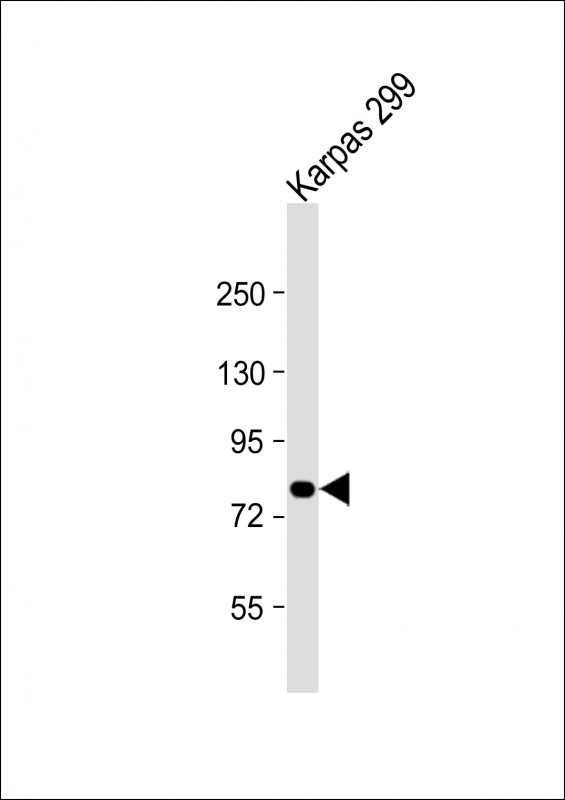
| WB | 1/2000 | Human,Mouse,Rat |
| IF | 咨询技术 | Human,Mouse,Rat |
| IHC | 咨询技术 | Human,Mouse,Rat |
| ICC | 技术咨询 | Human,Mouse,Rat |
| FCM | 咨询技术 | Human,Mouse,Rat |
| Elisa | 咨询技术 | Human,Mouse,Rat |
| Aliases | ALK tyrosine kinase receptor, 2.7.10.1, Anaplastic lymphoma kinase, CD246, ALK |
| Entrez GeneID | 238 |
| WB Predicted band size | 176.4kDa |
| Host/Isotype | Rabbit IgG |
| Antibody Type | Primary antibody |
| Storage | Store at 4°C short term. Aliquot and store at -20°C long term. Avoid freeze/thaw cycles. |
| Species Reactivity | Human |
| Immunogen | This ALK antibody is generated from a rabbit immunized with a KLH conjugated synthetic peptide between 1493-1527 amino acids from the C-terminal region of human ALK. |
+ +
以下是3篇与ALK抗体相关的代表性文献,供参考:
1. **《ALK antibodies in non-small-cell lung cancer》**
- 作者:Pao W, et al.
- 摘要:研究探讨了ALK融合蛋白(如EML4-ALK)在非小细胞肺癌(NSCLC)中的表达及临床意义,提出ALK免疫组化(IHC)作为筛查工具的有效性,并与FISH检测结果对比,证实其高特异性。
2. **《Comparative analysis of ALK detection by immunohistochemistry and FISH in lung adenocarcinoma》**
- 作者:Shaw AT, et al.
- 摘要:比较IHC(使用DSF3和5A4抗体)与FISH在检测ALK重排中的表现,发现IHC灵敏度达97%,建议其作为初筛方法以减少FISH的高成本和复杂性。
3. **《Mechanisms of resistance to ALK inhibitors and therapeutic strategies in ALK-positive cancers》**
- 作者:Katayama R, et al.
- 摘要:综述ALK抑制剂耐药机制,包括激酶域突变(如L1196M),强调基于抗体的检测方法在识别耐药突变和指导后续治疗(如新一代ALK抑制剂)中的应用。
4. **《Clinical activity of crizotinib in advanced ALK-positive NSCLC》**
- 作者:Kwak EL, et al.
- 摘要:报道克唑替尼在ALK阳性晚期NSCLC患者中的疗效,研究依赖Ventana ALK IHC抗体(D5F3)筛选患者,结果显示客观缓解率达61%,奠定ALK靶向治疗基础。
注:以上文献标题和内容为领域内典型研究方向概括,具体引用时建议通过PubMed或学术数据库核对真实文献信息。
ALK (anaplastic lymphoma kinase) antibodies are critical tools in diagnosing and researching cancers associated with ALK gene abnormalities. ALK, a receptor tyrosine kinase, plays a role in cell growth and differentiation. Its dysregulation—commonly due to chromosomal rearrangements (e.g., *EML4-ALK* fusion in non-small cell lung cancer) or mutations—drives oncogenic signaling. ALK antibodies are primarily used in immunohistochemistry (IHC) to detect ALK protein overexpression or aberrant localization in tumor tissues, aiding in diagnosing ALK-positive cancers like NSCLC, anaplastic large cell lymphoma, and inflammatory myofibroblastic tumors.
Diagnostically, ALK IHC assays (e.g., using clones D5F3 or ALK1) offer a cost-effective, rapid method to identify patients eligible for targeted ALK inhibitors (e.g., crizotinib, alectinib). These therapies block ALK-driven pathways, improving outcomes in ALK-positive cancers. However, antibody performance varies; some fusions (e.g., *KIF5B-ALK*) may evade detection, necessitating confirmatory testing via FISH or PCR.
Research applications include studying ALK's role in tumorigenesis, resistance mechanisms, and drug development. ALK antibodies also underpin companion diagnostics, ensuring precision in treatment selection. Despite advances, challenges persist in standardizing assays and interpreting heterogeneous ALK expression patterns. Overall, ALK antibodies remain pivotal in both clinical management and molecular oncology research.
×